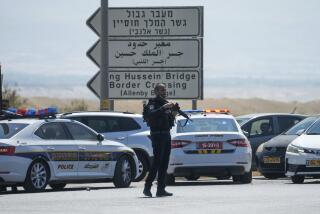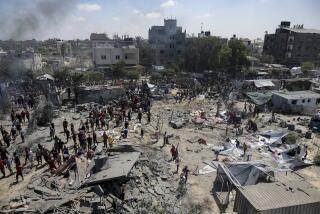Jordan tensely awaits word on pilot captured by Islamic State forces
Tension enveloped the Jordanian capital Sunday as darkness fell with no word about the fate of Lt. Moaz Kasasbeh, an Air Force pilot who was captured in December by the Islamic State militant group.
Safi Kasasbeh, father of the missing pilot, said talks for his son’s release were continuing between the extremist faction and government representatives.
“The door for negotiations remains open ... in all aspects,” he said, adding that the family had received no new information about his son’s plight.
The father made his remarks to relatives, supporters and journalists Sunday evening at a smoke-filled tribal meeting hall in Amman in what has become a daily ritual for the family.
Tensions escalated in the volatile case with the execution reported Saturday of Kenji Goto, a Japanese journalist whose fate had been linked to that of the Jordanian pilot.
Kasasbeh’s F-16 crash-landed late December over the de facto capital of the Islamic State, the northeastern Syrian city of Raqqa.
The pilot survived the landing when he parachuted into a river, but was picked up by fighters from Islamic State, which inundated social media with images depicting a clearly terrified Kasasbeh surrounded by triumphant militants. He hasn’t been heard from since.
There has been no confirmation from Islamic State in recent days that the missing pilot is still alive.
Jordan has said it would agree to a prisoner swap that would free the pilot in exchange for Sajida Al-Rishawi, a failed suicide bomber imprisoned since 2005 for her role in a string of hotel bombings in Amman. Islamic State, however, had only put the release of the Japanese journalist Goto on the table in exchange for Rishawi and never publicly offered to release the pilot.
Jordanian authorities have demanded some proof that the pilot is still alive before proceeding with any prisoner exchange.
The standoff has resulted in a deadlock in Jordan, a key U.S. ally and an important member of the U.S.-led coalition that has been bombing Islamic State positions in Syria. From the U.S. standpoint, it is critical to have Arab allies participating in the campaign.
On Sunday, the Jordanian state news agency Petra reported that King Abdullah had received a phone call from Japanese Prime Minister Shinzo Abe. The king expressed his “deep condolences” to the Goto family and the Japanese people, the news agency said.
The Japanese leader was reported to have said his country “would deepen its special relationships” with Jordan in several fields, especially counter-terrorism efforts.
The government spokesman, Mohammad Al-Momani, said in a statement Sunday that Jordan had “spared no effort in the name of preserving the life of the Japanese hostage and releasing him.” Jordan was a key intermediary in failed talks to release the Japanese journalist.
“[We] were in constant contact and coordination with the friendly government of Japan in this regard,” Momani said. He added that Jordan was continuing its effort to obtain proof that Kasasbeh is alive.
The case of the captured pilot has become an extremely polarizing issue in Jordan, pitting the government against a restive populace that includes many opposed to the country’s involvement in the U.S.-led coalition against Islamic State.
The pilot is part of a large and influential tribe in Jordan. In recent days, Kasasbeh tribal members have assailed the Jordanian government for not doing more to secure the pilot’s release. Some have accused Jordanian authorities of selling the pilot “for dollars” and threatened that Jordan’s security could be imperiled if the government did not take steps to ensure his release.
Yet in the aftermath of the Japanese journalist’s apparent execution, family statements appeared to take on a more conciliatory tone. The pilot’s father and others expressed confidence in the government’s handling of the delicate issue, even as the pilot’s fate remained a mystery.
Bulos is a special correspondent. Times staff writer Patrick J. McDonnell in Beirut contributed to this report.
More to Read
Sign up for Essential California
The most important California stories and recommendations in your inbox every morning.
You may occasionally receive promotional content from the Los Angeles Times.











